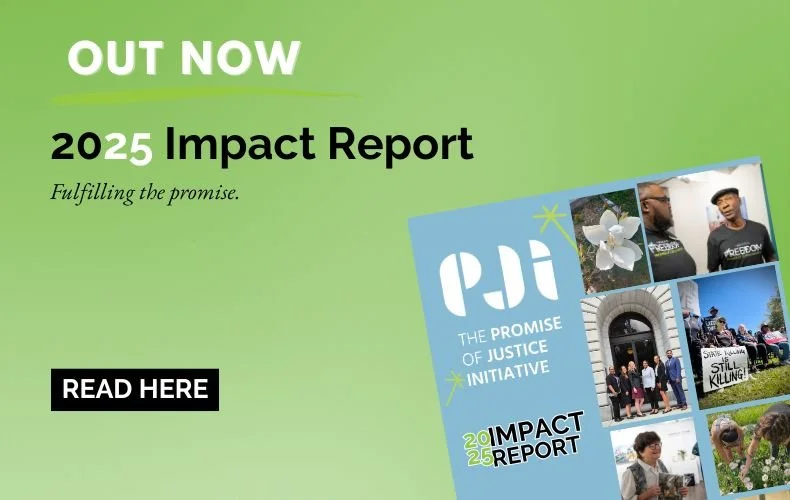Browse the report as full page spreads below or download the PDF.
Prior Reports
Punitive By Design
The Farm Line at the Louisiana State Penitentiary
PJI released this report on compulsory agriculture labor at the Louisiana State Penitentiary (Angola) in September 2023. Co-authored with Prof. Andrea Armstrong of Loyola University New Orleans College of Law, this report exposes the harsh conditions of forced labor at Angola and the serious harms caused by this practice. In addition to illuminating the history of forced prison labor in Louisiana, the report also helps preserve and uplift the voices of survivors of hard labor sentences.
2022 Annual Report
We formed the Promise of Justice Initiative (PJI) ten years ago, because we had a vision of a better justice system where all communities—including those in prisons—were safer and more secure. And we made a promise to work to fulfill that vision.
We promised to start a new type of organization: one that works to decarcerate, but also one that recognizes the value of each person. We promised to work toward the abolition of the death penalty and excessive sentences, but also to confront the legacy of Jim Crow in our justice system. We promised to tell the stories of what is happening behind prison walls.
Medical Release from Incarceration: A Study of Compassionate Release, Parole, and Furlough
The House Resolution (HR) 51 Task Force submitted their final report “Medical Release from Incarceration: A Study of Compassionate Release, Parole, and Furlough” to the Louisiana State Legislature on February 25, 2022. The task force was created in June 2021 “to study the efficacy of the current eligibility, recommendation, and approval processes for medical parole, medical treatment furlough, and compassionate release.” Task force members included representatives from the Louisiana Department of Public Safety and Corrections, the Louisiana Sheriff’s Association, Louisiana Department of Health, the Governor’s office, and community members such as family members of impacted people, medical professionals, and crime survivors.
Sheriffs as Carceral Controllers
“Sheriffs as Carceral Controllers” evaluates the origin, history, and current role of the Orleans Parish Sheriff and the office within the American justice system. With the position’s roots in British colonialism and American slave-catching practices, combined with the close ties to judges, lawyers, and police departments, sheriffs in the United States have long enjoyed sweeping power as chief law enforcement officers.
With little government oversight, sheriffs have continuously filled our jails and expanded local correctional systems. Lack of public knowledge about the role of the sheriff within law enforcement, along with historically minimal transparency, has paved the way for a lack of accountability allowing sheriffs to wield tremendous influence in the brutal legacy of America’s reliance on mass incarceration.
Brutality In the Name of “Safety”: Baton Rouge Parish Policing and Tactics
This report examines the policing tactics that Baton Rouge law enforcement agencies have used over the past two hundred years until the present day and finds that these methods are racist, violent and systematically over-police and over-incarcerate Black people.
If East Baton Rouge wants to protect its community members and curtail crime rates, parish officials should work to prevent crime from occurring in the first place by funneling funding into addressing the root causes (such as poverty and racism) rather than arresting and incarcerating people plagued by societal inequity.
Locked in with COVID-19:
A Review of How the 2020 Pandemic Ravaged Louisiana’s Prisons, Jails, and Detention Centers
In Louisiana, officials at federal, state, and local facilities have responded poorly to the pandemic by failing to implement mass testing and preventative measures, quarantining people in areas of prisons that had been previously closed due to decaying conditions, and failing to provide adequate medical care to those experiencing COVID-19 symptoms. This report details how COVID-19 progressed through correctional institutions across the state and how government officials have failed to properly respond to the pandemic.









